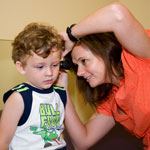Our 2-year old has started to stutter. Can he outgrow this or will he always have a problem?
Many children between the ages of 2 and 5 years will go through a period of time when they stutter. This is the time when they have the biggest leap in language skills and often their mind is racing faster than their mouth. You may notice your child repeats whole words or just the first syllable of the word. It may be more pronounced when he/she is tired, excited or upset.
For most children, this is a phase they go through over several years that may come and go for weeks at a time, disappearing completely by the age of 5. Making good eye contact with your child when he is stuttering and not interrupting him is important to helping him get through this.
Concerning signs associated with stuttering are if you notice your child’s voice begin to rise in pitch with the repetition. Tension and struggling with facial muscles as your child struggles to get words out is another sign that stuttering is beyond developmental. Lastly, if your child begins to avoid situations where he/she has to talk, be sure to talk to your pediatrician about a referral to Speech and Language Pathologist for help.
Our family enjoys summer trips to the beach, and I have a question about spray on sunscreens with kids. Are they as effective as traditional lotions, and is there a safety concern with spraying the aerosol on my kids faces? What SPF do you recommend for kids?
Sunscreen should be a critical part of your trip to the beach since it only takes one blistering sunburn to double your child’s risk of melanoma later in life. The most effective sunscreen is the one your child allows you to apply liberally over his entire body – especially the back of the knees, ears, eye area, neck and scalp. Aerosol sunscreens are safe and easy to apply, but care must be used around the eyes since it burns if it gets in the eyes. Your child also needs to hold their breath while spraying on the face to avoid inhaling it. You might find it easier to use a sunscreen stick on the face since they are sweat proof and don’t drip much. Save the aerosol for the body.
Look for a sunscreen that is SPF 30 or more and labeled “Complete” meaning it blocks both UVA and UVB sunlight. Waterproof is good too. Be sure to apply the sunscreen generously 30 minutes before going outside and remember to reapply every 2 hours, more often if swimming.
The information and content on our website should not be used as a substitute for medical treatment or advice from your doctor.




